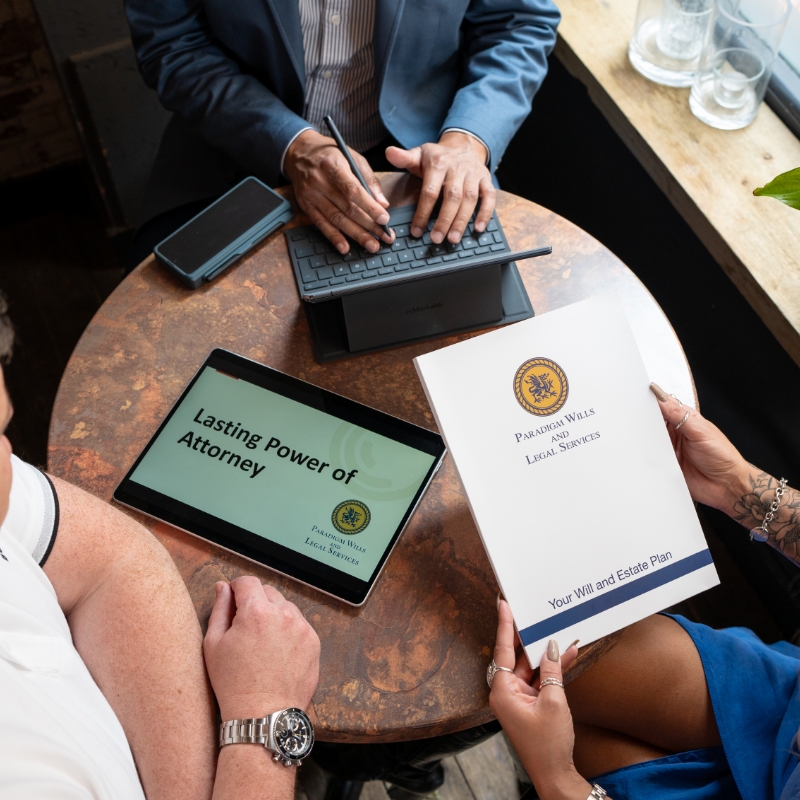Lasting Power of Attorney
The need to plan ahead becomes more and more critical as we grow older. At Paradigm, we recommend that you factor choosing a trusted Power of Attorney into your plans to ensure your affairs are in good hands in the event that you are unable to manage them yourself.





What is a Lasting Power of Attorney (LPA)?
An LPA is a legal document that allows you (the donor – also known as ‘the person giving this Lasting Power of Attorney’) to choose a person/person that you trust (attorney/attorneys) to make decisions on your behalf at a future time when you may not be able to, or simply no longer wish to.
You can create two types of LPA:
1. Property and Financial Affairs LPA
2. Health and Welfare LPA
This type of LPA covers health and care decisions and even where someone is to live. This document can only be used when the donor has lost mental capacity. Unless restrictions are included, the Attorney can do anything the donor would have done regarding personal welfare, for example:
- Where and with who you should live
- Day-to-day care
- Consenting and refusing medical treatment
- Arranging treatments such as dentists, doctors etc
- Life-sustaining treatment decisions can also be made by the Attorney, but only if the donor directs
Who can act as my Attorney (s)?
You must select your power of Attorney London very carefully; they should be trustworthy and have a duty to act in your best interests, considering your needs and wishes.
You can choose a close friend, relative, or legal professional as your lasting power of Attorney solicitors London. They should be over 18, have full mental capacity, and not be bankrupt. You can appoint more than one person to act, but you will need to decide how to appoint them. You can also appoint a substitute just in case something happens to an Attorney in your lifetime.











Without an LPA
If you lose mental capacity without a lasting power of attorney in place, it will be necessary for your family to apply to the Court of Protection to have a deputy appointed to deal with everyday financial matters. This is a slow and costly process, amounting to thousands of pounds.
Joint bank, building society, and business accounts can be severely restricted if one of the account holders loses mental capacity and there is no registered LPA. The restricting of a joint account has severe implications, as the joint owner cannot freely withdraw what is their own money without an order from the Court of Protection. This could be devastating, especially if the joint owner has their only form of income, such as their pension, paid into this joint account.
With our continued support, we free you from the burden of worry and provide you with peace of mind that your assets will be inherited by your loved ones when you are no longer here.
At Paradigm Wills and Legal Services, we genuinely care about educating people on the importance of making a will. In an industry often loaded with complex legal jargon and a conveyor-belt mentality, we provide a paradigm shift in how we offer our wills services. We aim to supply fresh ideas, clear and straightforward explanations, and a service tailored specifically to you. With you at the centre, we strive to make the will writing process as transparent as possible.
Contacting us is free. Have a consultation or a home visit with one of our experts and discuss your options with no obligation.
Our experienced legal advisors are on hand to provide you with all the advice you need with writing a Will, guidance on establishing a trust, help with applying for probate, and arranging prepaid funeral plans.


Get in touch
You may want to talk through your options first with our team of legal advisors. Fill out our form and the team will contact you to help you with everything you need to get started.


Court of Protection
Apply for approval from the Court of Protection to make decisions in your loved one's best interests.


Inheritance Tax
Reduce the impact of Inheritance Tax (possibly avoid it altogether) and maximise your tax allowance.


Probate
Let our specialists help lighten the load and take care of your probate application for your loved one.
